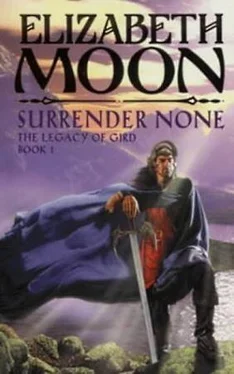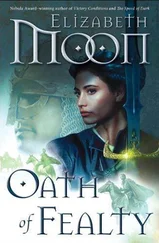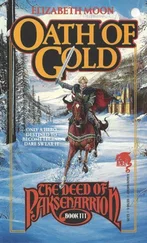Elizabeth Moon - Surrender None
Здесь есть возможность читать онлайн «Elizabeth Moon - Surrender None» весь текст электронной книги совершенно бесплатно (целиком полную версию без сокращений). В некоторых случаях можно слушать аудио, скачать через торрент в формате fb2 и присутствует краткое содержание. Жанр: Боевая фантастика, на английском языке. Описание произведения, (предисловие) а так же отзывы посетителей доступны на портале библиотеки ЛибКат.
- Название:Surrender None
- Автор:
- Жанр:
- Год:неизвестен
- ISBN:нет данных
- Рейтинг книги:3 / 5. Голосов: 1
-
Избранное:Добавить в избранное
- Отзывы:
-
Ваша оценка:
- 60
- 1
- 2
- 3
- 4
- 5
Surrender None: краткое содержание, описание и аннотация
Предлагаем к чтению аннотацию, описание, краткое содержание или предисловие (зависит от того, что написал сам автор книги «Surrender None»). Если вы не нашли необходимую информацию о книге — напишите в комментариях, мы постараемся отыскать её.
Surrender None — читать онлайн бесплатно полную книгу (весь текст) целиком
Ниже представлен текст книги, разбитый по страницам. Система сохранения места последней прочитанной страницы, позволяет с удобством читать онлайн бесплатно книгу «Surrender None», без необходимости каждый раз заново искать на чём Вы остановились. Поставьте закладку, и сможете в любой момент перейти на страницу, на которой закончили чтение.
Интервал:
Закладка:
Shrill yips from the western hill told him that the first part of his plan was working. His archers were falling back, coming around the slope into the hollow between the two hills—not a deep hollow, but one with its own peculiarities. The enemy archers should be making for the hilltop; he thought the cavalry would swing around, trying to take him in the rear, and so came the signal he had been waiting for.
It was amazing how many pits five thousand yeomen could dig in less than a day. Gird thought they could have dug a trench all across the meadow, but trenches could be jumped, and pits cleverly placed where horses must go between rocks of a rockfall—pits just too wide to jump easily—are a most effective cavalry trap. Thanks to the land and the Lady, he thought piously, for that fortuitously placed rockfall between the hill and the ridge behind it, where many horsemen could get into trouble out of sight of the rest of their army. His archers, having slipped around the hill to the rock-fall, were busy; the enemy archers above them, on the hilltop, found themselves unable to see what was going on. Those that tried to come down the south face of the hill to support the cavalry found the scour of the rockfall dangerous in more than one way. The others could—and did—let fly into the backs of the cohorts Gird had between the west and the central hill. He had anticipated this; those cohorts gave way, bending back around the hill; the archers found themselves having to shoot downhill into a confused mass of their own and Gird’s troops.
One unwary captain in the king’s forces saw that withdrawal as weakening, and urged his own cohorts on to flank those retreating. Gird smiled grimly. His left flank was now anchored by a wall of rock three men high—out of sight of that rash captain, up the little creek that looked so innocent. His troops stood on rock ledges, while their opponents were in the creek, or the mud on its other side. When they reached what they thought was his flank, they would find themselves standing on the far side of a pool of deep water, with no way out but the way they had come in. His archers would find them easy targets.
Meanwhile, the knot of bright-clad nobles across the field was moving again—perhaps it been only exhaustion that felled them. Gird squinted; he was sure he saw someone still on the ground. Out of the trees across from him came yet more cohorts of infantry, more squadrons of cavalry, and some—he squinted, shook his head, and looked again—some did not look human. Magicks, he told himself firmly. It’s only magicks. Masks and costumes and fancy ways of frightening people into doing what you want. He wished he knew if the king’s whole reserve was committed now.
Below him, the main forces contended as they had all morning, in a heaving, sweating, bloody, snarling mass. If it comes to plain fighting, he had told his marshals, if it comes to simple pounding each other, we win: we’ll pound harder, and take more pounding. The king’s army now outnumbered his in the center, but his center had not given back at all. They leaned into their pikes with every thrust, grunting with the effort.
Then the king’s new reserves hit the back of his force, giving it that extra weight—man against man, those in front were forced forward by that pressure, onto the waiting pikes. They died, had to be shaken from the pikes, and others were already there, already being killed—and again, and again. Gird saw the shiver in his ranks, the realization that something new had entered. The marshals looked aside, trying to find Gird; he caught their eyes and waved with his free hand. Then he took the long pole and signaled his last reserve, across the meadow and up on the ridge behind the king’s camp.
It seemed to take forever for that reserve to appear; he had told them to hide neither on the ridgetop nor near the bottom. In the meantime, his center sagged backward, and the enemy, heartened, drove forward with renewed energy. Gird had hardly time to see the first of his reserves clear the trees, yelling their heads off and sprinting downhill toward the enemy rear, before he was down in the thick of his own battle, supporting the center.
Fighting on horseback was completely different, he found. He had dropped the banner-pole, no longer needed—from here they would fight to the death, win or lose; he had no more decisions to make—and pulled his hauk from his belt. It was good for bashing heads, and bashing heads from above worked as well as when he was afoot. For one moment he thought of Amisi, and shoved the thought aside.
Later, when he heard it in songs, the battle of Greenfields (as the meadow became known) sounded much tidier than it had been in reality. The songs didn’t mention the several times he was knocked off the horse, and remounted by some helpful soldier, or the blow to his knee that had him limping for a quarter year, or the near-rout when the enemy’s last cohort of reserves turned out to be masked magelords with their power in hand. The songs certainly did not mention that long and miserable night after the battle, with the forest fire still burning its way south, or the cries of the wounded that never ceased. And somehow in the songs, that gray horse turned white. Gird was sure he had not aged that much in one day.
He remembered stumping through what had been the enemy’s camp, swarming now with squads of his own yeomen gathering up supplies and weapons. The king’s tent had gone up first, larger than many houses Gird had seen, with interior rooms walled in fluttering embroidered panels. He had had musicians with him (two had been killed, almost accidentally, when Gird’s reserves tore through the camp; the others had been found crouched around their instruments), and a man who painted pictures on lengths of fabric. He had started a picture of the king, victorious, returning with Gird’s head, but offered to change the faces for only ten gold pieces. Gird shook his head, and wondered what kind of king would take musicians and painters to battle.
The king was dead. He did not look much like Selamis, but fathers and sons did not have to look alike. He had been a tall man, dark haired as many magelords were, and in death his eyes had only the dull color of a fish found dead on the shore. Gird had found Sier Segrahlin’s body, spiked with arrows from behind; he felt no guilt at that, but wished he could have talked to that brown man. They had almost understood each other, across a gulf no one else wanted to bridge. He still wondered, occasionally, if the sier had charmed him that night.
The songs listed the dead magelords, as if to remind the listener that these were all real. Gird did not even look at all of them; he had seen bodies enough. They had killed the wounded as quickly and painlessly as they could; they had killed all the magelords they captured; they dared not do less. At least there were no children with them.
He did not understand why he was still alive; his vision of the morning had been so clear, so certain. He felt curiously suspended, as he had after the Norwalk Sheepfolds, unable to rejoice in the same way as the others, though he felt a deep contentment. So many had died, and he had not, yet he had been sure he would—he had been almost promised he would. Nor had Rahi died, or Pidi; he found them both alive, marked but certainly not mortally wounded. But when he touched them he felt no more and no less than he felt for any of his yeomen: they were all his children, in some way he could not define.
He remembered coming back to his own encampment, holding the wounded and dying, speaking what comfort he could, until he fell asleep and woke to find that someone had covered him with a stolen piece of the king’s tent. All that day and the next, as the crows and flies fought with them, he tried to bring order and restore health to that trampled and discolored ground. “Bury them all,” he said, “Or burn them—even the magelords, yes: we had the gods’ gift of victory, we owe them respect.”
Читать дальшеИнтервал:
Закладка:
Похожие книги на «Surrender None»
Представляем Вашему вниманию похожие книги на «Surrender None» списком для выбора. Мы отобрали схожую по названию и смыслу литературу в надежде предоставить читателям больше вариантов отыскать новые, интересные, ещё непрочитанные произведения.
Обсуждение, отзывы о книге «Surrender None» и просто собственные мнения читателей. Оставьте ваши комментарии, напишите, что Вы думаете о произведении, его смысле или главных героях. Укажите что конкретно понравилось, а что нет, и почему Вы так считаете.












